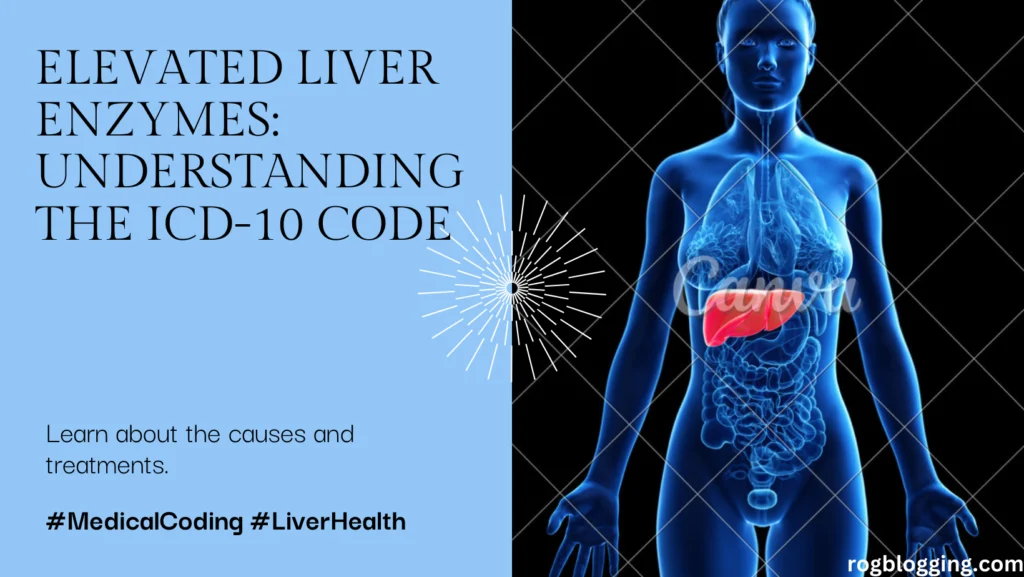Introduction: Elevated Liver Enzymes ICD 10 Codes
Elevated Liver Enzymes ICD 10 Codes, when it comes to monitoring our health, blood tests play a crucial role in providing valuable insights into our overall well-being. One such blood test measures the levels of liver enzymes, which can indicate the health of our liver.
What are the 10 Functions of the Liver? The 10 Vital Functions of the Liver: A Comprehensive Guide
Elevated liver enzymes can be a cause for concern, as they may indicate an underlying health issue. In this article, we will delve into the causes, symptoms, and ICD-10 codes associated with elevated liver enzymes.
Table of Contents
What are Liver Enzymes?
Liver enzymes are proteins that are produced by the liver cells and play a vital role in various metabolic processes. They are responsible for breaking down substances, such as drugs, alcohol, and toxins, in the body.
5 Understanding Where is Your Liver Located on Your Body
The most common liver enzymes measured in a blood test are alanine aminotransferase (ALT) and aspartate aminotransferase (AST).
Understanding Elevated Liver Enzymes:
Elevated liver enzymes refer to higher than normal levels of ALT and AST in the blood. These elevated levels can be an indication of liver damage or inflammation.

However, it is important to note that elevated liver enzymes do not necessarily mean that you have a serious liver condition.
What is the Elevated Liver Enzymes ICD 10?
There can be various factors that contribute to elevated liver enzymes, and further diagnostic tests may be required to determine the underlying cause.
Causes of Elevated Liver Enzymes ICD 10 Codes:
There are several potential causes for elevated liver enzymes, including:
- Alcohol consumption: Excessive alcohol consumption can lead to liver damage and elevated liver enzymes.
- Hepatitis: Viral hepatitis, such as hepatitis A, B, or C, can cause liver inflammation and elevated liver enzymes.
- Non-alcoholic fatty liver disease (NAFLD): This condition is characterized by the accumulation of fat in the liver, leading to inflammation and elevated liver enzymes.
- Medications: Certain medications, such as statins, antibiotics, and anti-seizure drugs, can cause liver damage and elevated liver enzymes as a side effect.
- Autoimmune diseases: Conditions like autoimmune hepatitis and primary biliary cholangitis can cause inflammation and damage to the liver, resulting in elevated liver enzymes.
- Obesity: Being overweight or obese can contribute to the development of NAFLD, which can lead to elevated liver enzymes.
Symptoms of Elevated Liver Enzymes ICD 10 Codes:
In many cases, elevated liver enzymes do not cause any noticeable symptoms. They are often discovered during routine blood tests or when investigating unrelated health concerns.
21 Day Fatty Liver Diet Plan: The Basics of NAFLD
If you experience any of these symptoms, it is important to consult with a healthcare professional for proper evaluation and diagnosis.
ICD-10 Codes for Elevated Liver Enzymes ICD 10 Codes:
The International Classification of Diseases, Tenth Revision (ICD-10) provides a standardized system for coding medical diagnoses.
What Diet is Best for Fatty Liver? 5 Comprehensive Guide to Improve Liver Health
When it comes to elevated liver enzymes, the specific ICD-10 codes may vary depending on the underlying cause. Here are some commonly used ICD-10 codes related to elevated liver enzymes:
- K70 – Alcoholic liver disease
- K73 – Chronic hepatitis, not elsewhere classified
- K76.0 – Fatty (change of) liver, not elsewhere classified
- K76.6 – Portal hypertension
- K76.7 – Hepatorenal syndrome
- K77 – Liver disorders in diseases classified elsewhere
It is important to consult the latest version of the ICD-10 coding manual or consult with a medical professional for accurate coding based on the specific diagnosis.

Conclusion:
Elevated liver enzymes can be a sign of an underlying liver condition or other health issues. It is essential to work with a healthcare professional to determine the cause and appropriate treatment plan.
How Long Can You Live with Fatty Liver? Understanding the 7 Impact and Solutions
Regular monitoring of liver enzyme levels through blood tests can help in early detection and intervention. Remember, elevated liver enzymes do not automatically indicate a serious condition, but they should not be ignored.
By understanding the causes, symptoms, and appropriate ICD-10 codes, you can take proactive steps towards maintaining a healthy liver and overall well-being.

